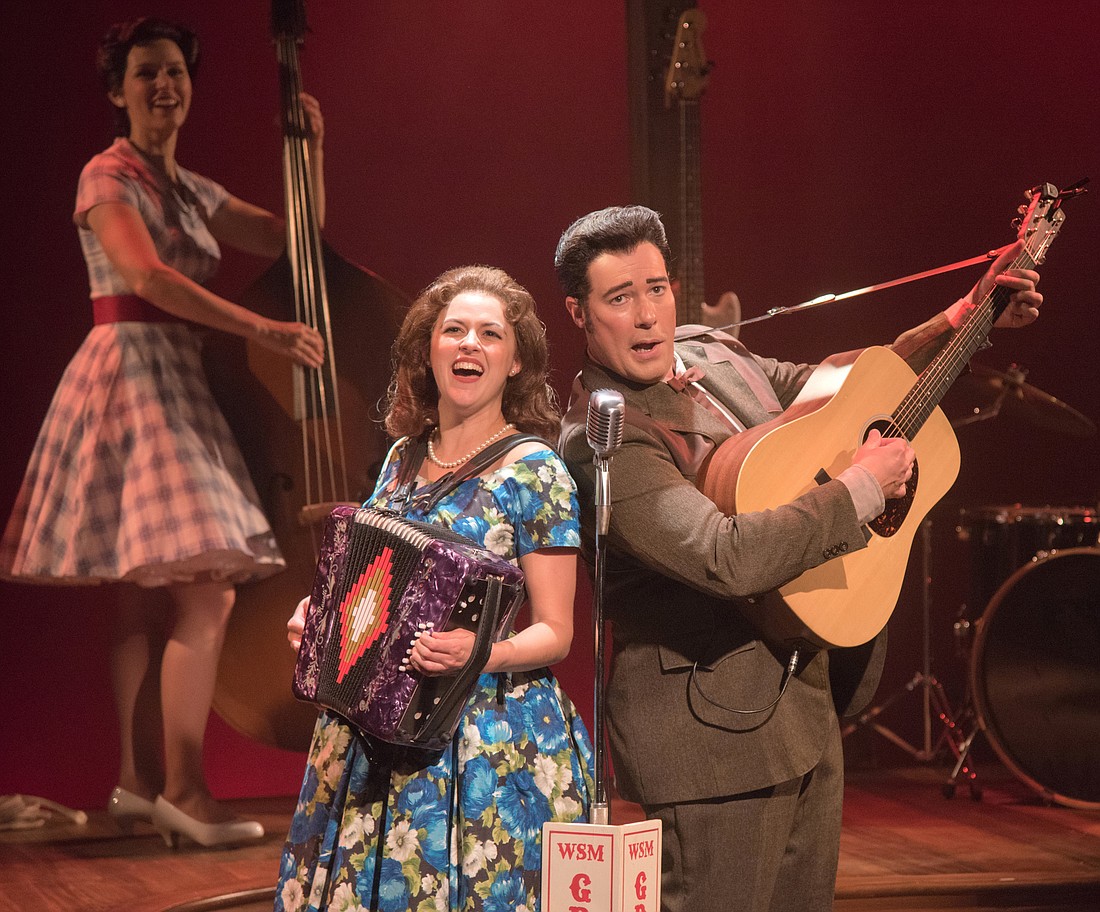- April 8, 2025
-
-
Loading

Loading

“Ring of Fire” is a gripping mix of the sacred and the profane.
That applies to both the song and Florida Studio Theatre’s latest musical, “Ring of Fire: The Music of Johnny Cash.”
It definitely applies to the show’s hero and antihero: Johnny Cash.
Richard Maltby Jr. created the original Broadway musical, based on an idea by William Meade. Meade and Jason Edwards tweaked the book and song selections for subsequent off-Broadway productions.
What did they come up with?
Loosely speaking, “Ring of Fire” is a rock/country star biography. These generally include a look at the star’s impoverished country childhood and a glimpse at the star’s unsupportive first wife. Cash’s bio delivers on both points.
The star also usually struggles with alcoholism or substance abuse. Cash is no exception here, either. This musical also touches on the redemptive power of his second wife, June Carter.
“Ring of Fire” touches on all of these story points. The story’s accurate and all of the quotes are taken from Cash’s autobiography. Accurate or not, the story’s as thin as a guitar string, and if you already know Cash’s life story, that definitely helps. This musical is more focused on his larger-than-life talent and laconic personality.
That and his unforgettable songs.
Scott Moreau delivers on both the personality and the talent. No wonder. He’s a veteran of countless Johnny Cash portrayals, including a long stint on the national tour of “The Million Dollar Quartet.” In this production, he’s backed by four other talented actor/musicians: Elizabeth Nestlerode, Eric Scott Anthony, Katie Barton and Morgan Morse.
They each play various parts and all of the available instruments. (In this production, that includes a steel guitar, a mandolin, electric guitars, acoustic guitars, a banjo, an electric bass, an upright bass, a Dobro, an autoharp, an accordion and drums. Not to mention a kazoo.) What they play adds up to 32 songs.
These tunes range from heartbreaking to hilarious. In the context of Cash’s hardscrabble Arkansas childhood and the death of his older brother, “Five Feet and Rising” and “Will the Circle Be Unbroken” are incredibly moving.
Cash was the songwriter for many of these anthems — including “Man in Black,” “Folsom Prison Blues,” “Hey Porter,” and “Cry, Cry, Cry.” But June Carter herself penned “Ring of Fire” — and “A Boy Named Sue” sprang from Shel Silverstein’s twisted mind. That’s one of the funny tunes, along with Jack Clement’s “Dirty Old Egg-Sucking Dog.”
I liked this musical’s song choices; most of them, anyway. The original Broadway show included Cash’s cover of Trent Reznor’s “Hurt,” but the follow-up productions cut it. That hurt.
(I’d send the dirty dog back to the doghouse and put it back in.)
Dogged criticisms aside, “Ring of Fire” has plenty of heart. Moreau doesn’t do a full-on Johnny Cash impression — but he’s fully invested in the character, and you can tell he’s pouring his body and soul into the tribute.
Such story as you’ll find here is a tale of love and redemption. Cash took the Biblical instruction to visit folks in prison literally. His performance at San Quentin set inmate Merle Haggard on the path to becoming a singer-songwriter when he got out. As to the love story, Nestlerode is winning in her scenes portraying June Carter, the child of a famous family of gospel singers. She plays her character as the yin to Cash’s yang — and head-over-heels in love with the man, as improbable as that may seem. (Which it did, at the time.)
Johnny Cash and June Carter were the oddest of odd couples. (Her “Ring of Fire” basically asks, “What the heck am I doing falling in love with this guy?”) But these opposites couldn’t fight their attraction.
Moreau is a crowd-pleaser in the scene where Cash pops the question to June Carter before 7,000 concertgoers in London, Ontario. The FST audience shouted out, “Say yes!” One wiseguy hollered, “Don’t do it!”
Moreau brought the house down when he informed the audience, “We can hear you up here, you know.”
That’s just one lighthearted moment in a train ride through lands of light and darkness.
Director Ben Hope keeps the heaven-bound train going at a brisk pace. Music director Eric Scott Anthony; costume designer Katie Barton; lighting designer Andrew Gray; and sound designer Thom Korp, all lovingly shape the music and mood.
Kudos also to scenic designer Ben Hope. His set (which doubles for everything from The Grand Ol’ Opry to Sun Records Studio) has the look of a well-worn, but lovingly polished wooden stage.
It all adds up to a character study through the lens of music. And that character was a study in contradictions.
Cash may have been the “Man in Black,” but his soul wasn’t as simple as black and white. Like the song itself, he was mixture of sacred and profane — and he knew it. As Cash once said …
“There is a spiritual side to me that goes real deep, but I confess right up front that I’m the biggest sinner of them all.”